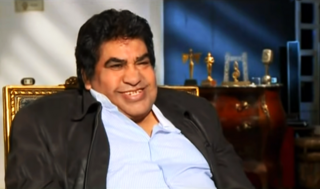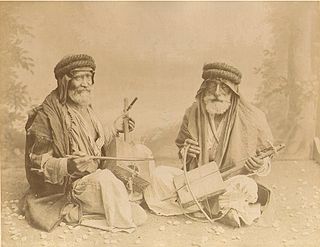Related Research Articles

The tambourine is a musical instrument in the percussion family consisting of a frame, often of wood or plastic, with pairs of small metal jingles, called "zills". Classically the term tambourine denotes an instrument with a drumhead, though some variants may not have a head. Tambourines are often used with regular percussion sets. They can be mounted, for example on a stand as part of a drum kit, or they can be held in the hand and played by tapping, hitting, or shaking the instrument.

Raï, sometimes written rai, is a form of Algerian folk music that dates back to the 1920s. Singers of Raï are called cheb as opposed to sheikh, the name given to Chaabi singers. The tradition arose in the city of Oran, primarily among the poor. Traditionally sung by men, by the end of the 20th century, female singers had become common. The lyrics of Raï have concerned social issues such as disease and the policing of European colonies that affected native populations.
A roots revival is a trend which includes young performers popularizing the traditional musical styles of their ancestors. Often, roots revivals include an addition of newly composed songs with socially and politically aware lyrics, as well as a general modernization of the folk sound.

Algerian music is virtually synonymous with Raï among foreigners; the musical genre has achieved great popularity in France, Spain and other parts of Europe. For several centuries, Algerian music was dominated by styles inherited from Al-Andalus, eventually forming a unique North African twist on these poetic forms. Algerian music came to include suites called nuubaat. Later derivatives include rabaab and hawzii.

The music of Nigeria includes many kinds of folk and popular music. Little of the country's music history prior to European contact has been preserved, although bronze carvings dating back to the 16th and 17th centuries have been found depicting musicians and their instruments. The country's most internationally renowned genres are Indigenous, Apala, Aurrebbe music, Rara music, Were music, Ogene, Fuji, Jùjú, Afrobeat, Afrobeats, Igbo highlife, Afro-juju, Waka, Igbo rap, Gospel, and Yo-pop. Styles of folk music are related to the over 250 ethnic groups in the country, each with their own techniques, instruments, and songs. The largest ethnic groups are the Igbo, Hausa and Yoruba. Traditional music from Nigeria and throughout Africa is often functional; in other words, it is performed to mark a ritual such as the wedding or funeral and not to achieve artistic goals. Although some Nigerians, especially children and the elderly, play instruments for their own amusement, solo performance is otherwise rare. Music is closely linked to agriculture, and there are restrictions on, for example, which instruments can be played during different parts of the planting season.

The rich and varied music of Sudan has traditional, rural, northeastern African roots and also shows Arabic, Western or other African influences, especially on the popular urban music from the early 20th century onwards. Since the establishment of big cities like Khartoum as melting pots for people of diverse backgrounds, their cultural heritage and tastes have shaped numerous forms of modern popular music. In the globalized world of today, the creation and consumption of music through satellite TV or on the Internet is a driving force for cultural change in Sudan, popular with local audiences as well as with Sudanese living abroad.
Arabic music is the music of the Arab world with all its diverse music styles and genres. Arabic countries have many rich and varied styles of music and also many linguistic dialects, with each country and region having their own traditional music.

Ahmed Adaweyah is a prominent Egyptian actor and singer of Egyptian Sha'abi music. He also starred in 27 Egyptian films.

Bedouin music is the music of nomadic Bedouin Arab tribes in the Arabian Peninsula, North Africa, Mesopotamia and the Levant. It is closely linked to its text and poems. Songs are based on poetry and are sung either unaccompanied, or to the stringed instrument, the rebab. Traditional instruments are the rebab and various woodwinds. Examples of Bedouin music are the Samri of Saudi Arabia, Aita of Morocco, and the internationally recognised Rai of Algeria.

Abdel Hakim Abdel Samad Kamel, known by the mononym Hakim, is an Egyptian shaabi singer.

The various nations of the region include the Arabic-speaking countries of the Middle East, the Iranian traditions of Persia, the Jewish music of Israel and the diaspora, Armenian music. Azeri Music, the varied traditions of Cypriot music, the Turkish music of Turkey, traditional Assyrian music, Coptic ritual music in Egypt as well as other genres of Egyptian music in general. It is widely regarded that some Middle-Eastern musical styles have influenced Central Asia, as well as the Balkans and Spain.

Jaipongan, also known as Jaipong is a popular traditional dance of Sundanese people from Indonesia. The dance was created by Gugum Gumbira, based on the traditional Sundanese Ketuk Tilu music and pencak silat movements.

Arabic pop music or Arab pop music is a subgenre of pop music and Arabic music.
Fathy Salama is a Grammy Award-winning Egyptian musician, who usually appears with his ensemble Sharkiat.

Roman Bunka was a German guitarist, oud player and composer, active in world music and jazz fusion bands. He lived most of his life in Munich, Bavaria, where he was involved in various musical crossover projects.

Belly dance is a Middle Eastern dance that originated in Egypt, which features movements of the hips and torso. It has evolved to take many different forms depending on the country and region, both in costume and dance style; with the Egyptian styles and costumes being the most recognized worldwide due to Egyptian cinema. Belly dancing in its various styles and forms is popular worldwide with many schools around the globe practicing it.

Dina El Wedidi, is an Egyptian singer, composer, guitarist, music producer, and storyteller. Dina has been known as the lead performer of an ensemble of musicians who have performed extensively in the past 2 years, fusing local and global styles of music.

Abdelhamid Ali Ahmed al-Shaeri, better known as Hamid al-Shaeri, is an Egyptian-Libyan singer, songwriter, and producer, who lives in Egypt. He is considered one of the most influential figures in Arabic pop and has been credited for incorporating Western music styles of synth-pop, western dance, and rock and roll influences alongside traditional Arabic musical features, which came to be known as El Geel.

Arab folk dances, also referred to as Oriental dance, Middle-Eastern dance and Eastern dance, are the traditional folk dances of the Arabs in Arab world. Arab dance has many different styles, including the three main types of folklore, classical, and contemporary. It is enjoyed and implemented throughout the Arab region, from North Africa to the Middle East.

Basem Darwisch is an Egyptian–German composer, producer and oud virtuoso. He is the founder of Cairo Steps Ensemble, He is the first musician in the Middle East to be awarded the German golden jazz award in 2018 and 2021.